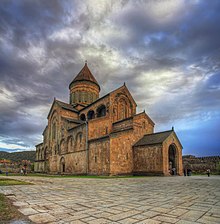Education
The education system of Georgia has undergone sweeping modernizing, although controversial, reforms since 2004. Education in Georgia is mandatory for all children aged 6–14. The school system is divided into elementary (6 years; age level 6–12), basic (3 years; age level 12–15), and secondary (3 years; age level 15–18), or alternatively vocational studies (2 years). Students with a secondary school certificate have access to higher education. Only the students who have passed the Unified National Examinations may enroll in a state-accredited higher education institution, based on ranking of scores he/she received at the exams.
Most of these institutions offer three levels of study: a Bachelor's Program (3–4 years); a Master's Program (2 years), and a Doctoral Program (3 years). There is also a Certified Specialist's Program that represents a single-level higher education program lasting for 3–6 years. As of 2008, 20 higher education institutions are accredited by the Ministry of Education and Science of Georgia.[159] Gross primary enrollment ratio was 94% for the period of 2001–2006.
Culture
Georgian culture evolved over thousands of years with its foundations in Iberian and Colchian civilizations, continuing into the rise of the unified Georgian Kingdom under the single monarchy of the Bagrationi. Georgian culture enjoyed a golden age and renaissance of classical literature, arts, philosophy, architecture and science in the 11th century.
The Georgian language, and the Classical Georgian literature of the poet Shota Rustaveli, were revived in the 19th century after a long period of turmoil, laying the foundations of the romantics and novelists of the modern era such as Grigol Orbeliani, Nikoloz Baratashvili, Ilia Chavchavadze,Akaki Tsereteli, Vazha Pshavela, and many others. Georgian culture was influenced by Classical Greece, the Roman Empire, the Byzantine Empire, and later by the Russian Empire.
Georgians have their own unique 3 alphabets which according to traditional accounts was invented by King Pharnavaz I of Iberia in 3rd century BC.
Georgia is well known for its rich folklore, unique traditional music, theatre, cinema, and art. Georgians are renowned for their love of music, dance, theatre and cinema. In the 20th century there have been notable Georgian painters such as Niko Pirosmani, Lado Gudiashvili, Elene Akhvlediani; ballet choreographers such as George Balanchine, Vakhtang Chabukiani, and Nino Ananiashvili; poets such as Galaktion Tabidze,Lado Asatiani, and Mukhran Machavariani; and theatre and film directors such as Robert Sturua, Tengiz Abuladze, Giorgi Danelia and Otar Ioseliani.
Religion
A large majority of Georgia's population (83.9% in 2002)practices Orthodox Christianity. The Georgian Orthodox Church is one of the world's most ancient Christian Churches, and claims apostolic foundation by Saint Andrew. In the first half of the 4th century Christianity was adopted as the state religion of Iberia (present-day Kartli, or Eastern Georgia), following the missionary work of Saint Nino of Cappadocia.[168][169] The Church gained autocephaly during the early Middle Ages; it was abolished during the Russian domination of the country, restored in 1917 and fully recognised by the Ecumenical Patriarchate of Constantinople in 1990.
The special status of the Georgian Orthodox Church is officially recognised in the Constitution of Georgia and the Concordat of 2002, although religious institutions are separate from the state, and every citizen has the right of religion.
Religious minorities of Georgia include Armenian Christians (3.9%), Muslims (9.9%), and Roman Catholics (0.8%). Islam is represented by both Azerbaijani Shia Muslims (in the South-East) and ethnic Georgian Sunni Muslims in Adjara. Georgian Jews trace the history of their community to the 6th century BC; their numbers have dwindled in the last decades due to strong emigration towardsIsrael.
Despite the long history of religious harmony in Georgia, there have been several instances of religious discrimination and violence against "nontraditional faiths", such as Jehovah's Witnesses, by the followers of the defrocked Orthodox priest Vasil Mkalavishvili.

